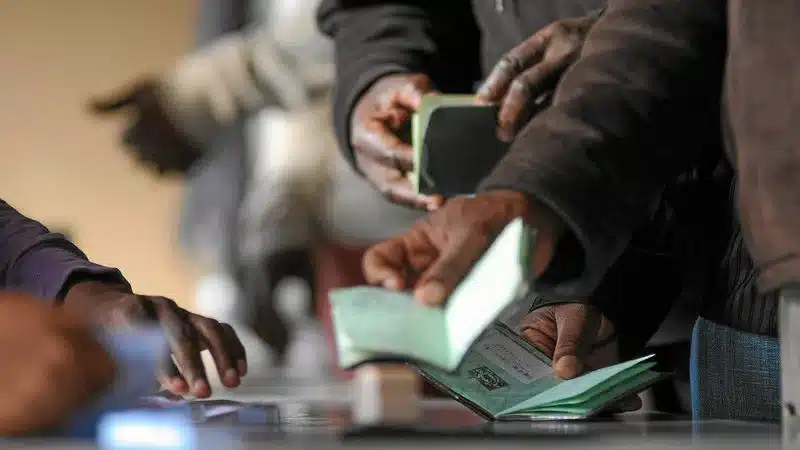South Africa’s paper-based elections to date, have largely been free-and-fair. The absence of Electoral Court cases regarding ballot production or counting irregularities is evidence enough to bear this out. While this is a real feather in the cap of the Independent Electoral Commission (IEC), the recent inclusion of independent candidates to the ballot presents a few new challenges that may need a transition to electronic voting.
Is ballot length such a big deal?
The expected increase in paper ballot length due to the inclusion of independent candidates, as well as the relative position of each candidate on the physical ballot, will definitely influence political campaigning and voter behaviour.
Apart from the ballot design needing to mitigate counterfeits, the longer physical voting ballots will increase ballot production costs and may intimidate voters. A recent study of voting in the Philippines (where some ballots were 7-feet long) exposed an unintended consequence of these absurd ballot lengths. Voters experienced cognitive overload which increased voter tension particularly amongst the elderly, illiterate or special needs voters.
Does candidate position matter?
Recent research suggests that this ballot choice fatigue, or “roll-off”, impacts participation because voters are less likely to choose a candidate positioned further down the ballot. According to findings, choice fatigue roll-off reduces voter turnout by 6-8%.
Research also showed that ordering the candidate or party name alphabetically resulted in unintentional candidate bias. Some electoral boards mitigate this bias through straw polls, party membership size and party performance in the previous similar election. Interestingly, placement at the top or bottom of the ballot is considered primary positioning. This has proven to improve relative positional performance. Candidates with primary positions are known to campaign based on their placement to win votes through clever sloganeering like ‘vote last – for lasting impact’ or “vote first for the top candidate”.
The IFP’s late show
Remember how some allege that the Inkatha Freedom Party (IFP) played chicken with our first democratic elections in 1994? The IFP only entered after the ballots were printed forcing an addition to the ballot. Some observers believe that this was a primary effect strategy to ensure that the IFP gained positional advantage on the ballot.
Is it time to move to digital voting?
To mitigate the primary effect strategy in paper based voting, Mary Beth Beazley suggested ballot rotation which randomizes or rotates candidate positioning on every printed ballot. She coined the delightful phrase “An ounce of rotation is worth a pound of litigation.” This rotation, however, is a major printing production challenge. Randomising the ballot will increase the cost of ballot production considerably, which we simply cannot afford. Such is the paradox of progress.
This sets the stage for a radical new approach: E-voting. E-voting is the electronic means of capturing a vote and or the electronic means of counting or tabulating votes. A nation is most fragile between the time voting starts and the results are announced. E-voting offers speed and eliminates this period. This was validated by Brazil when, with 156 million voters, it announced its runoff results a couple of hours after the election.
E-voting recovers after the US debacle
In the aftermath of the 2020 American Presidential elections, e-voting suffered serious international reputational damage. The Fox News network made repeated allegations over the role of the Smartmatic and Dominion voting machines played in Trump losing the elections. Fox and Dominion Voting Systems were sued but were eventually paid a $787 million settlement over the false claims. The Smartmatic matter is still before the court. This case is important because the court found that the machines were not rigged, which counterintuitively, enhanced the reputation and reliability of e-voting.
Is it time to cross the digital bridge?
E-voting is capable of randomizing candidates, with easy searchable navigation of large candidate lists and tailored navigation to help voters with disabilities. Young voters are also more likely to engage meaningfully with a digital voting process than a paper one.
Given the existing awkward coalition governments and the potential for increased national and provincial coalitions, e-voting can facilitate a more effective and participative democracy through more frequent e-referendums or plebiscites.
The key challenges, however, are the high capex cost, grid unreliability, and the need to change the voting ecosystem. Whether we like it or not, we live in an instant, digital world. We want instant results. Any delay in results generates and even elevates suspicion of electoral interference. It is time that e-voting moves from the periphery into the mainstream.
This article is also available at Mail & Guardian, where it was originally published on 24 April 2024.
Prof. Colin Thakur
Dr Surendra Thakur (Colin) completed a DTech in Information Technology, of which his research focused on “System Architecture for Secure Mobile Internet Voting”. Additionally, Colin has presented various papers with reference to RFID and has received the Best Paper Award at the DUT Informatics Conference in the years 2007 and 2008.
Colin has served on many executive forums over the years such as EXCO, SENATE, Faculty Board, etc. He was also the National Treasurer of the Computer Society of South Africa (CSSA) for a year, and later on the Chair of the KZN Computer Society of South Africa for three years, and Vice-Chairman for two years.
Thakur was commissioned by the Electoral Commission of South Africa (IEC) to undertake an international study of electronic voting (e-voting) practices completed in 2012 called “Electronic Voting – the cross-national experience.” This was a comprehensive study of all countries trialing, piloting, implementing, using and then abandoning e-voting. He also evaluated the effectiveness Voter Registration practices with a particular focus on technology on behalf of the UNDP (2013). Additionally Colin has delivered 6 keynotes on this topic, wrote five papers and was an international observer in the 2011 Zambian election. He has observe two e-voting elections this year. He along with Prof Olugbara are developing a multimodal biometric voter validation system to leverage the ubiquity of mobile devices as a voting tool.
Colin is currently the Director of the NEMISA KZN e-Skills CoLab at the Durban University of Technology which is tasked with e-skills in general, and particularly on the e-enablement of government services for effective service delivery, with a focus on e-democracy and e-participation. Collin has also conceptualized and introduced InvoTech, an innovation incubator at DUT, where one of his patents is being registered. International E-Voting expert. Emerging expert in Social Media. National authority on Big Data.
Director of the KZN Digital CoLabhttps://sibusisoh.net/website_5098fab2/wp-content/uploads/2024/06/images.jpeg





